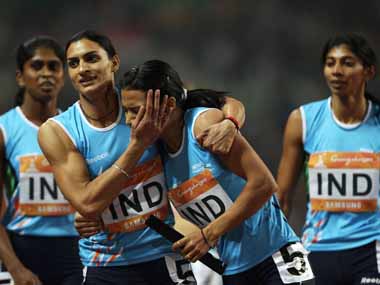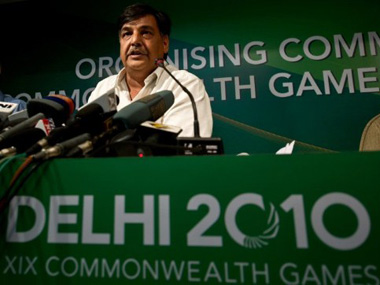Sitting locked up in the confines of Tihar Jail doesn’t faze Lalit Bhanot one bit. Neither does the high court rejecting his bail plea have an effect. In fact, in a certain sense, he’s rather pleased because being in jail allows him to escape the media frenzy that’s taking place outside. The world of Indian athletics is being rocked by the doping scandal as almost not a day passes without another skeleton tumbling out of the closet. It started off with India’s quarter-milers testing positive but then emerged reports of some junior boxers and weight-lifters getting caught in the net. And somewhere, there remains the stinking suspicion that the worst is yet to come. But through all this, Bhanot sits unaffected. For the last 15 years, the man who was Suresh Kalmadi’s right-hand man, has run the Athletics Federation of India. Here’s the sad bit: He still is running the show from jail! As recently as June 17, Bhanot was
re-elected
in the absence any opposition. “AFI secretary can be removed if he himself resigns or there is a no-confidence motion against him. In the absence of these, Bhanot remains the AFI Secretary,” a top AFI official told the media. They say, the rot begins at the top and nothing could be truer in this case. Bhanot’s mentor, Suresh Kalmadi continues to
head
the Asian Athletics Association. Doesn’t the fact that these two are now in jail bother the rest of the office bearers? Has no one asked them to resign? [caption id=“attachment_37168” align=“alignleft” width=“380” caption=“Lalit Bhanot in this file photo. AFP”]
 [/caption] Ashwini Nacchappa has been campaigning against politicians holding the top spot in sporting federations for a long time and the irony isn’t lost on her. “The athletes are doping, everyone knows that. The Athletics Federation of India is being run from a jail, everyone knows that too,” says Nacchappa, who has represented India at the Olympics. “Sports Minister Ajay Maken knows that too and while he has done the right thing by saying that he will take strict action against all those involved, one can only hope that it isn’t all talk.” “I refuse to believe that the Federation didn’t know what was happening,” said Ashwini. “They are all hand-in-glove with each other. Nothing can happen at the camps without the federations knowing. That’s the truth.” VR Beedu, who as a former national coach was in charge of the Indian squad from the 1974 Asian Games to 1986 Asiad including all the Olympic Games in between, resigned from Sports Authority of India in 1991 for the same reason. “I believe it all changed with the break-up of the Soviet Union. Their coaches realised that they had no value in their own country any more and started to look elsewhere. And then once you are hired, you have to show results and quick results often do the trick,” said Beedu. Beedu is also against the hiring of foreign coaches simply because he believes Indian coaches are just as good. But instead of making the Indian coaches become better, he’s seen most of the Indian coaches at SAI being reduced to an interpreter’s role. “Hiring coaches from the Russian Bloc is a bad idea because they are pretty desperate. If you really want to hire coaches, hire the best. But that’s something the federations will never do. It’s expensive and that gets the media involved,” Beedu further added. Continue reading on the next page Performance-enhancing substances have always been seductive. But doping means different things to different people… to a select few it means Olympic glory, to others it means multi-million contracts but to most in the Indian athletics system, it means a government job and a settled future. In a poll conducted by Sports Illustrated in 1995, 198 Olympic-level sportspersons were asked whether they would take banned substances with the guarantee they would not get caught, win every competition for the next five years, yet die from the side-effects. More than half of them answered “Yes.” [caption id=“attachment_37177” align=“alignleft” width=“380” caption=“Ashwini Chidananda Akkunji and Mandeep Kaur of India after winning the gold in the Women’s 4 x 400m Relay Final during the Asian Games. Both have tested positive for using drugs to enhance performance. Mark Dadswell/Getty Images”]
[/caption] Ashwini Nacchappa has been campaigning against politicians holding the top spot in sporting federations for a long time and the irony isn’t lost on her. “The athletes are doping, everyone knows that. The Athletics Federation of India is being run from a jail, everyone knows that too,” says Nacchappa, who has represented India at the Olympics. “Sports Minister Ajay Maken knows that too and while he has done the right thing by saying that he will take strict action against all those involved, one can only hope that it isn’t all talk.” “I refuse to believe that the Federation didn’t know what was happening,” said Ashwini. “They are all hand-in-glove with each other. Nothing can happen at the camps without the federations knowing. That’s the truth.” VR Beedu, who as a former national coach was in charge of the Indian squad from the 1974 Asian Games to 1986 Asiad including all the Olympic Games in between, resigned from Sports Authority of India in 1991 for the same reason. “I believe it all changed with the break-up of the Soviet Union. Their coaches realised that they had no value in their own country any more and started to look elsewhere. And then once you are hired, you have to show results and quick results often do the trick,” said Beedu. Beedu is also against the hiring of foreign coaches simply because he believes Indian coaches are just as good. But instead of making the Indian coaches become better, he’s seen most of the Indian coaches at SAI being reduced to an interpreter’s role. “Hiring coaches from the Russian Bloc is a bad idea because they are pretty desperate. If you really want to hire coaches, hire the best. But that’s something the federations will never do. It’s expensive and that gets the media involved,” Beedu further added. Continue reading on the next page Performance-enhancing substances have always been seductive. But doping means different things to different people… to a select few it means Olympic glory, to others it means multi-million contracts but to most in the Indian athletics system, it means a government job and a settled future. In a poll conducted by Sports Illustrated in 1995, 198 Olympic-level sportspersons were asked whether they would take banned substances with the guarantee they would not get caught, win every competition for the next five years, yet die from the side-effects. More than half of them answered “Yes.” [caption id=“attachment_37177” align=“alignleft” width=“380” caption=“Ashwini Chidananda Akkunji and Mandeep Kaur of India after winning the gold in the Women’s 4 x 400m Relay Final during the Asian Games. Both have tested positive for using drugs to enhance performance. Mark Dadswell/Getty Images”]
 [/caption] The methods of doping have become technically very advanced since then but one wonders whether the ideology has changed at all. A similar poll in this day and age would probably yield results that will not be very different. After all, it isn’t cheating if everyone is doing it. “There’s only one way to stop something like this,” says Beedu. “The Ministry has to go after the big fish. Get them and the rest will fall in line.” In this case, some of the big fish are already in jail, so perhaps it will be easier to get the job done. “If we want to clean up Indian athletics, this is the time,” said Ashwini. “Do it now, set the examples and make sure that people remember what happens. Perhaps, then each time someone thinks of doping, the images that will come to mind won’t be of Olympic glory but of ruin.” Memories can be incredibly fickle. Just yesterday, Maken spoke about how this doping scandal was the first of its kind in Indian athletics but he conveniently forgot that since 1994, five Indian athletes— Jagbir Singh, Shubhdeep Singh, Rajinder Singh, Gurbax Singh Randhawa and Harminder Singh — have tested positive. He’ll probably say that he didn’t know just as the athletes, the coaches and the federations officials also said they didn’t. The point here, however, is simple. If they didn’t then it was their job to know. Hopefully, a few months down the line, Maken won’t be saying that he didn’t know what happened to the doping inquiry. Hopefully, a few months down the line, Bhanot still won’t be in charge. Hopefully, a few months down the line, Indian athletes will be smarter. There a lot of hope in there. But that’s only because when all else fails, hope still floats.
[/caption] The methods of doping have become technically very advanced since then but one wonders whether the ideology has changed at all. A similar poll in this day and age would probably yield results that will not be very different. After all, it isn’t cheating if everyone is doing it. “There’s only one way to stop something like this,” says Beedu. “The Ministry has to go after the big fish. Get them and the rest will fall in line.” In this case, some of the big fish are already in jail, so perhaps it will be easier to get the job done. “If we want to clean up Indian athletics, this is the time,” said Ashwini. “Do it now, set the examples and make sure that people remember what happens. Perhaps, then each time someone thinks of doping, the images that will come to mind won’t be of Olympic glory but of ruin.” Memories can be incredibly fickle. Just yesterday, Maken spoke about how this doping scandal was the first of its kind in Indian athletics but he conveniently forgot that since 1994, five Indian athletes— Jagbir Singh, Shubhdeep Singh, Rajinder Singh, Gurbax Singh Randhawa and Harminder Singh — have tested positive. He’ll probably say that he didn’t know just as the athletes, the coaches and the federations officials also said they didn’t. The point here, however, is simple. If they didn’t then it was their job to know. Hopefully, a few months down the line, Maken won’t be saying that he didn’t know what happened to the doping inquiry. Hopefully, a few months down the line, Bhanot still won’t be in charge. Hopefully, a few months down the line, Indian athletes will be smarter. There a lot of hope in there. But that’s only because when all else fails, hope still floats.
'The Athletics Federation of India is run from a jail'
Ashish Magotra
• July 6, 2011, 18:21:29 IST
Lalit Bhanot, in jail for his part in the CWG scam, continues to run the show and if that’s the case at the top, can we really expect the sport to find its way out of trouble?
Advertisement
)
End of Article